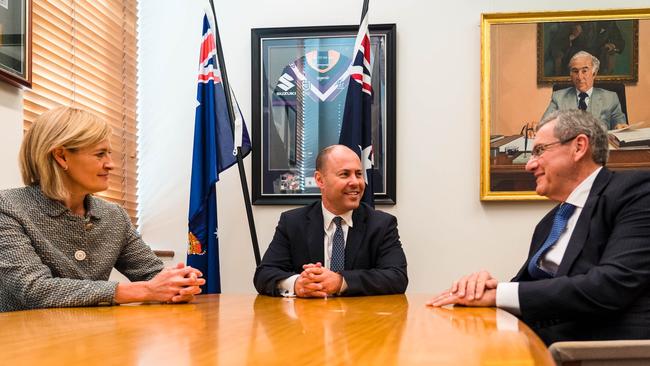ASIC leads deregulation push to help recovery
ASIC sets up unit to ease regulatory burden on business, as it tries to help economic recovery while still retaining its cop role.

The Australian Securities & Investments Commission has set up a special purpose unit to ease the regulatory burden on business as it treads the fine line between facilitating economic recovery from Covid-19 and being a tough cop on the beat.
The scope and priorities of the new ASIC regime under chairman Joe Longo became clearer on Thursday after Josh Frydenberg unveiled the Morrison Government’s formal statement of expectations, and the regulator responded with its statement of intent and corporate plan for 2021-25.
The statement of intent said the purpose of the dedicated unit was to “change the way we administer the law to minimise the costs and burdens of regulatory requirements” for businesses.
In the corporate plan, Mr Longo flagged “smarter regulation”, particularly for the small business sector.
“We will facilitate innovation, consider the impact of our work on competition, and work with industry to enhance cyber-resilience,” he said.
“We will seek to minimise the cost of regulatory interactions with ASIC, as well as exercise ASIC’s regulatory relief powers where appropriate.
“At the same time, we remain steadfast in our commitment to promote market integrity and to protect Australian consumers and investors from harm.
“We will do this by identifying, disrupting and deterring poor behaviour in our regulated space.”
Mr Frydenberg’s statement of expectations said ASIC would contribute to the government’s economic goals, including recovery from the pandemic.
ASIC was expected to work closely with the government and Treasury on the implementation of policy reforms and in the exercise of policy related functions, and operate as a non-executive body under the leadership of Mr Longo and deputy chair Sarah Court.
The chairman would have sole responsibility for the executive management of the regulator.
The statement of expectations is designed to clear up the miscommunication and uncertainty which characterised the relationship between the government and previous ASIC regime under chairman James Shipton.
Mr Shipton was caught in a row of relocation expenses and was subsequently cleared of any wrongdoing.
As part of a commercial settlement, the ASIC chair returned to his job but only until a successor was found.
Close ASIC observers have said that the requirement for ASIC to contribute to the government’s economic goals signalled a softer touch regulatory regime.
Ironically, this followed the regulator’s appearance before the Hayne financial services royal commission, where it was excoriated by commissioner Ken Hayne for not being a tough cop on the beat.
Clarification that ASIC would operate as a non-executive body under Mr Longo’s leadership was a response to confusion surrounding roles and responsibilities of senior executives under Mr Shipton.
ASIC said Mr Longo would have sole responsibility for executive management, relying on key executives to carry out day-to-day management activities and deal with operational issues.
“(He) will delegate functions where he considers this would benefit the executive management of ASIC,” the regulator said.
Much of the corporate plan covered continuing workstreams, although there were some significant additions and extensions.
For example, with the introduction of design and distribution obligations in October, the regulator said it would undertake risk-based surveillance on a range of products, such as those offered by high-growth buy now, pay later platforms.
Where appropriate, it would take enforcement action against entities issuing products with little or no consumer benefit, as well as firms engaging in mis-selling.
ASIC said it would continue to conduct supervision of financial institutions which had the greatest impact on consumers and markets in order to seek a continuous improvement in outcomes.
A new area of work in this regard would be in-depth supervisory reviews of the effectiveness of internal audit functions in improving consumer outcomes and reducing harm.
Another new workstream would be probing the lending standards of the nation’s non-banks.
After the passage of new laws, ASIC would engage with the prudential regulator to promote consistency on lender obligations, and gather information about new systems, policies and procedures and assess industry implementation.
A new focus in the insurance industry would be to examine pricing misconduct in general insurance.
The review would examine whether premiums and discounts were correctly calculated and charged.
Controls used by insurers to identify and adequately respond to pricing issues, such as overcharging premiums, would be probed, and regulatory action would be taken to deter misconduct.
ASIC would also support and contribute to the Australian Law Reform Commission’s review of the Corporations Act.
Mr Longo said ASIC would continue to be a “strong and targeted” law enforcement agency, using its full suite of tools and powers to address wrongdoing.
“There are significant law reforms coming into effect over the coming months,” he said.
“We recognise that, in order to realise the longer term benefits of these reforms, we must engage actively and transparently with industry.”
Internally, he said, ASIC would strengthen its organisational infrastructure to make it a more efficient, effective and modern regulator.
This would include drawing on the findings of an independent review of the agency’s support functions.
The recommendations of the review would be implemented over the coming year.
Finally, an important focus would be to enhance and fully use ASIC’s data and cyber-resilience capabilities.
“A strong financial system is vital to supporting economic growth and recovery, promoting innovation and enabling Australians to invest for their financial future,” Mr Longo said.



To join the conversation, please log in. Don't have an account? Register
Join the conversation, you are commenting as Logout